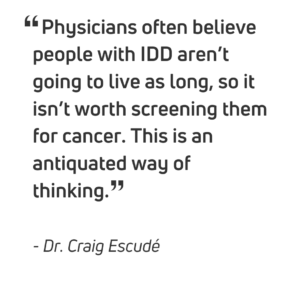 New Study Finds Significantly Worse Cancer Survival Rates for People with Intellectual and Developmental Disabilities
New Study Finds Significantly Worse Cancer Survival Rates for People with Intellectual and Developmental Disabilities
Clearwater, April 8, 2024
By Daniel Mutter
Researchers conclude that improvements in physician training are an essential step to lowering mortality rates for disabled cancer patients.
A new study published in the Canadian Journal of Public Health found people with intellectual and developmental disabilities (IDD) suffered higher instances of death after being diagnosed with breast, colorectal, or lung cancer.
According to Breast (female), Colorectal, and Lung Cancer Survival in People with Intellectual or Developmental Disabilities: A Population-Based Retrospective Cohort Study, published February 5, 2024, patients with IDD were 2.74 times more likely to die from breast cancer, 2.42 times more likely to die from colorectal cancer, and 1.49 times more likely to die from lung cancer. (1)
Researchers examined data from nearly 340,000 adults diagnosed from 2007 to 2019 in Ontario, Canada. Patients were followed from their date of index cancer diagnosis until they died or by December 31, 2021, whichever came first. With few exceptions, worse survival for people with IDD persisted regardless of stage at diagnosis. Five-year survival for patients with IDD vs. no IDD was 61.5% vs. 81.7% for those with breast cancer, 34.2% vs. 56.6% for colorectal cancer, and 11.9% vs. 19.7% for lung cancer. (2)
The study points to several causes for poorer health outcomes for cancer patients with IDD. According to study author Dr. Alyson Mahar, implicit and explicit biases and ableism within medicine and nursing often contribute to inequitable health outcomes.

“Physicians often believe people with IDD aren’t going to live as long, so it isn’t worth screening them for cancer. This is an antiquated way of thinking,” says Dr. Craig Escudé, President of IntellectAbility. “Studies have shown that healthcare workers are often under the impression that people with IDD have a lower quality of life. But it’s important to recognize that just because somebody’s life is different doesn’t mean it’s of a lower quality. We must value all people and invest time and energy to help them live fuller and healthier lives.”
According to the study, misconceptions about quality of life and gaps in physician knowledge are directly linked to a lack of training in how to care for people with IDD properly. It can often be challenging for healthcare workers to diagnose cancer in patients who don’t use words to communicate how they are feeling. Limitations in recognizing early signs of health destabilization in any population sub-group can lead to delayed or improper diagnoses and, in turn, poorer health outcomes.
“It’s so important that we train clinicians to be able to look for other signs of early health destabilization. If we can catch these things earlier by increasing screenings and being more attuned to the different ways that a person might present with signs or symptoms of an illness, we’re much more likely to produce better health outcomes,” says Escudé.
IntellectAbility’s eLearn course, The Curriculum in IDD Healthcare (CIDDH), aims to address gaps in the delivery of medical care to people with IDD. A newly published study in the peer-reviewed journal Knowledge found that trainees deemed CIDDH very effective. By addressing the unique needs of individuals with IDD, healthcare training programs like CIDDH can reduce health disparities and improve the quality of life among patients with IDD. (3)
“The Curriculum in IDD Healthcare teaches clinicians how health conditions appear differently in people with IDD, how their communication styles might be different, and how adverse behaviors might be an early sign of health destabilization, including for diseases like cancer,” says Escudé. “It’s important and valuable for healthcare workers to investigate those early signs and symptoms, just like they would for anyone else, to be able to make more accurate diagnoses, pick up on things earlier, and improve health outcomes.”
Sources:
1. https://link.springer.com/article/10.17269/s41997-023-00844-8
2. https://www.medscape.com/viewarticle/intellectual-disabilities-linked-worse-cancer-survival-2024a10003j8?form=fpf
3. https://www.mdpi.com/2673-9585/4/1/4
Author Daniel Mutter can be reached at Daniel (at) mutterworks.com
Published in the EIN Presswire


